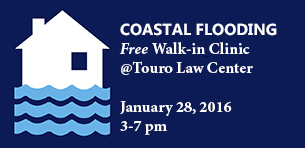Winter Storm Jonas Recovery Guidance
About

Winter Storm Jonas Recovery Guidance
Touro Law's Disaster Relief Clinic to Hold Free Walk-in Clinic for Coastal Flooding Victims
January 25, 2016Winter Storm Jonas hammered parts of the mid-Atlantic and Northeast regions with near-blizzard conditions, record coastal flooding, and winds over 70 mph in some coastal areas. Just a few inches of water can cause thousands of dollars of damage to a home.
If you need assistance reviewing your insurance coverage documents or compiling your claims, the Touro Law Disaster Relief Clinic will be holding a free walk-in clinic at Touro Law Center on Thursday, January 28, 2016, from 3:00 -7:00 pm. Touro Law Center is located at 225 Eastview Drive, Central Islip, NY 11722. For more information, please call our hotline at (631) 761-7198 or follow our Facebook page for updates - www.facebook.com/TLCDisasterRelief.
Below is some helpful information on insurance coverage and funding for repairs after a major flooding event.
Contact your Insurance Company
Contact both your flood insurance and homeowners insurance companies as soon as possible after the flood. Get complete and current copies of any policies you may have on your home, auto and other property. Locate the “Declarations Page” for each one and review the coverages and limitations. Flood insurance policies have different rules than home policies. Damage caused by wind would be covered under the Homeowners Policy and damage caused by flood waters would be covered by flood insurance.
If a home or flood adjuster says damage isn’t covered, get an independent professional opinion before giving up on collecting insurance benefits for repairs.
Take Pictures
Before you remove any items or make any repairs, fully document all damage for your insurer by taking photos or video. Digital versions are best so they can be easily store and copied. If you clean, dry and/or make repairs prior to photographing the damage, you may decrease the amount of your flood insurance recovery.
Complete and Inventory
Focus on completely inventorying and valuing all damage and costs to repair/clean and replace property, regardless of your insurance situation. What damage did the flood do to your home and possessions? When listing and describing damage, make a chart including: (1) item, (2) location of item at time of loss, (3) condition and age of item, (4) actual cash value and replacement cost of item.
Dry out and arrange for temporary repairs ASAP to avoid mold growth and additional damage After contacting your flood and homeowners insurance companies, use a sump pump, available from most hardware or home supply stores, or/and a wet vacuum to remove water from your home.
Mold can develop within 24 to 48 hours of a flood, so remove wet contents, including carpeting and bedding, as soon as possible. If an item has been wet for less than 48 hours, it may be salvageable. However, you’ll need to decide whether it holds enough monetary or sentimental value to try to do so. Notify your insurance company before removing and disposing of any large or high value items. Photograph ALL flood-soaked items.
Keep good records, a journal and receipts
If there is repair or remediation work completed prior to an adjuster coming to your home, keep a copy of the invoices and receipts for work which has already been performed and materials purchased.
Keep a diary of conversations and all correspondence with insurance, repair, government and other professionals.
Contractors
Make sure any contractor is qualified, licensed, insured to perform the scope of services they are presenting. Check references before signing any contracts for services or hiring vendors.
Be extra cautious about contractors and vendors that show up at your front door uninvited. Most reputable companies will not go door-to-door seeking business.
Insist on detailed proposals and estimates, and contracts with clear and reasonable payment schedules.
Try to make all payments with a check or credit card. In the event you make any payments in cash make sure the contractor provides a signed receipt stating the amount paid, and what services that payment covers.
Nassau County Consumer Affairs: https://apps.nassaucountyny.gov/oca/ocacaos.php
Suffolk County Consumer Affairs: http://labor.suffolkcountyny.gov/contractorsearch/
Contact Information
American Red Cross - www.redcross.org/prepare/disaster/winter-storm
Touro Law Center Disaster Relief Clinic - www.facebook.com/TLCDisasterRelief
The above was compiled by non-profit disaster victim advocates in New York, New Jersey, and California that provide pro bono service and have expertise in insurance aspects of flood recovery. This information is based on lessons learned in the aftermath of Superstorm Sandy and many other flood events.
The Touro Law Center Disaster Relief Clinic has been involved in Superstorm Sandy Recovery since just 48-hours after the storm assisting New York homeowners and renters. Contact Melissa H. Luckman, Practitioner in Residence of the Disaster Relief Clinic,
Ocean County Long Term Recovery Group - Actively helping New Jersey homeowners and renters recover from Sandy. Contact: Sue Marticek, Executive Director, smarticek@oceancountyltrg.org, 732-569-3484, http://oceancountyltrg.org.
United Policyholders - United Policyholders has been providing long term recovery support in communities impacted by floods, hurricanes, earthquakes and other disasters since 1991. Contact Amy Bach, Esq., Executive Director, info@uphelp.org, http://www.uphelp.org.
XXX
Touro College Jacob D. Fuchsberg Law Center’s 185,000-square-foot, state-of-the-art law school is located adjacent to both a state and a federal courthouse in Central Islip, New York. Touro Law’s proximity to the courthouses, coupled with programming developed to integrate the courtroom into the classroom, provide a one-of-a kind learning model for law students, combining a rigorous curriculum taught by expert faculty with a practical courtroom experience. Touro Law, which has a student body of approximately 650 and an alumni base of more than 6,000, offers full- and part-time J.D. programs, several dual degree programs and graduate law programs for US and foreign law graduates. Touro Law Center is part of the Touro College system.
Touro Law’s newly implemented Portals to Practice is a cutting-edge, experiential learning program that reconceives and restructures the law school experience. Portals to Practice expands the scope and quality of legal education by focusing on the development of legal professionals, from pre-law through post-graduation.
About the Touro College and University System
Touro is a system of non-profit institutions of higher and professional education. Touro College was chartered in 1970 primarily to enrich the Jewish heritage, and to serve the larger American and global community. Approximately 19,000 students are currently enrolled in its various schools and divisions. Touro College has branch campuses, locations and instructional sites in the New York area, as well as branch campuses and programs in Berlin, Jerusalem, Moscow, Paris and Florida. New York Medical College, Touro University California and its Nevada branch campus, as well as Touro University Worldwide and its Touro College Los Angeles division are separately accredited institutions within the Touro College and University System. For further information on Touro College, please go to: http://www.touro.edu/media/.
Patti Desrochers
Director of Communications
(631) 761-7062
pattid@tourolaw.edu

